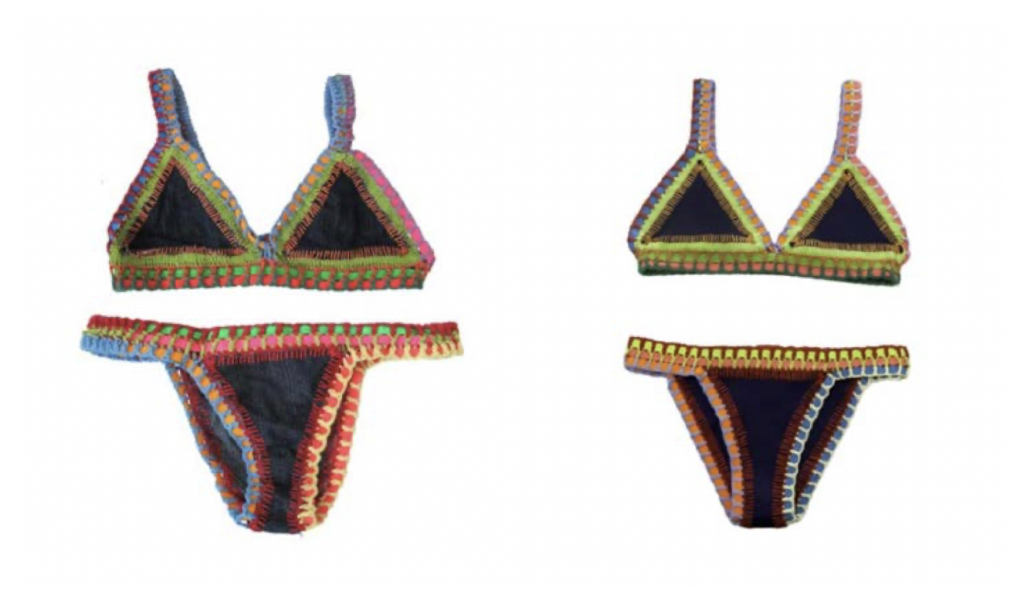Since it was first filed in 2018, a closely-watched case over lookalike bikinis has made headlines. Spawning a years-long, bi-coastal legal battle that raised questions about cultural creations and ownership (as well as functionality and originality), and commanding in-depth attention from the New York Times, which published an award-nominated take on the legal squabble in December 2018, entitled, “The Itsy-Bitsy, Teenie-Weenie, Very Litigious Bikini,” the case pitted a virtually unknown bikini designer against a buzzy, celebrity-endorsed brand. Almost four years later, the case has come to a close, with a New York federal court siding with New York-based KIINI and its founder, and against Brazilian artisan Maria Solange Ferrarini.
At the heart of the headline-garnering lawsuit, which got its start in a California federal court in June 2018: The design of a colorful crochet bikini, which Ferrarini claimed that KIINI and its founder Ipek Irgit stole from her, passed off as their own original creation, and build a multi-million brand on, complete with a registration from the U.S. Copyright Office. With such alleged copying and misrepresentation in mind, counsel for Ferrarini, then 61-years-old, set out claims of copyright and trade dress infringement, as well as unfair competition, and common law conversion, among others, and sought monetary damages in the millions.
Cutting Down the Case
The case was transferred to the U.S. District Court for the Southern District of New York in early 2019, where Judge Lorna Schofield would break down the matter in parts, dismissing a number of Ferrarini’s claims in early 2020, and then ultimately, handing a victory to KIINI and Irgit last week on the remaining copyright infringement cause of action on the basis that the statute of limitations – or the amount of time a party has to initiate legal proceedings from the date of an alleged offense – had run out before Ferrarini had begun to wage her copyright fight against KIINI.
But first things first: last year, Schofield lobbed her first big hit at Ferrarini’s case when she dismissed the unfair competition, conversion, and intentional interference claims. In her January 2020 decision on KIINI’s motion to dismiss, the judge summarized Ferrarini’s legal action as centering on the allegations that the defendants built their brand on a certain bikini design, which they “falsely portrayed Irgit as the creator of” both in the media and in a U.S. Copyright Office filing. (That filing resulted in a registration (No. VA0001943361) being issued to Irgit in 2014 for “bathing suit art.”) The problem with KIINI’s story, according to Ferrarini’s complaint, is that the brand only began making its staple bikinis after Irgit purchased a lookalike product from Ferrarini on the beach in Brazil in 2012. Irgit then – allegedly – sent photos of the bikini she bought from Ferrarini to a Chinese manufacturer in order to make a prototype, and a year later, launched her KIINI label.
Dismissing Ferrarini’s unfair competition, conversion, and intentional interference claims in January 2020, Judge Lorna Schofield held that the claims were already covered – and thus, were preempted – by Ferrarini’s federal copyright infringement claim, and even if they were not preempted, Ferrarini “fail[ed] to make allegations sufficient to state a claim” for each of those causes of action.
With those three claims out of the way, the court gave the green-light to Ferrarini’s copyright infringement claim, finding that Ferrarini had preliminarily “state[d] a claim to relief that is plausible on its face.’” More specifically, Judge Schofield determined that Ferrarini’s copyright infringement claim was not barred by the statute of limitations, even if KIINI argued to the contrary. Despite KIINI’s argument that “the extensive press coverage of [its] bikini in 2014 and 2015, in combination with [its] registration of the copyright is sufficient to have put [Ferrarini] on notice that KIINI claimed the design as [its] own,” and should have prompted her to file suit earlier, the court preliminarily determined that Ferrarini’s copyright claim was “timely because it accrued in 2018, when [she] was informed of the defendants’ infringement.”
“Nothing in the complaint indicates that [Ferrarini] was aware of the defendants’ bikini sales prior to 2018,” the judge held, noting that if “mere registration” with the Copyright Office were sufficient to put a plaintiff on notice of infringement, that would a “vastly burdensome” standard.

A few months later, KIINI sought to take down Ferrarini’s remaining cause of action, and filed a lengthy motion for summary judgment in March 2020, in which it claimed that it was entitled to an early (i.e., pre-trial) victory given that Ferrarini lacked the necessary legal basis to prevail on her copyright infringement claim. Setting the stage, KIINI asserted that Irgit drew “on years of crochet experience and other inspirations [when she] created a bikini design involving loops of elastic passing through crochet hoops.” That very bikini would come to be the center point of Irgit’s brand, after landing on magazine covers, appearing in seemingly countless Instagram posts, being knocked-off by an array of other brands (including Victoria’s Secret), and grossing nearly $10 million in sales, according to the New York Times.
Shooting down Ferrarini’s copying allegations, counsel for KIINI argued that Irgit may not have launched her brand until 2013, but she had been making similar bathing suits for years, dating back to “when she was 10 or 11” when she would make them with her grandmother in Çeşme, Turkey. “[Irgit] did not copy the design; she did not steal the design; she did not infringe on anyone else’s design,” KIINI stated in the filing, arguing that while Ferrarini claims that she first started selling her bikinis on the beach in Brazil in 1998, she “never attempted to sell her bikinis outside of Trancoso and has never engaged in any marketing of her bikinis.”
More importantly, KIINI argued that Ferrarini made no attempts to “enforce any intellectual property rights arising from the bikini” design until she filed suit against KIINI with the help of her legal counsel Jason Forge – who allegedly sought out Ms. Ferrarini and landed her as a client after learning of KIINI’s budding litigation with Neiman Marcus – in the summer of 2018. In fact, Ferrarini “sat on any rights she may have had and did not file her claim until well after the statutory period ran,” KIINI argued. In short, Ferrarini waited too long and as a result, any merited claim of copyright infringement that she may have had became barred by the relevant statute of limitations, which mandates that a copyright-specific action must be commenced within 3 years of the claim accruing.
According to KIINI, the clock on that 3-year period began to run when Ferrarini first learned that KIINI was selling its allegedly infringing bikinis, which KIINI has claimed dates back “as early as 2013 or 2014,” as that is when Ferrarini “admitted that she had actual knowledge of the marketing of the KIINI bikini.” By failing to act within the allotted amount of time, KIINI argued that Ferrarini’s copyright claim is “time barred as a matter of law,” and thus, it is entitled to summary judgment (or a judgment entered by the court without a full trial when the record establishes that “there is no genuine dispute as to any material fact”) on the copyright claim.
But Ferrarini did not merely fail to initiate legal action in a timely manner. KIINI claimed in its March 2020 motion for summary judgment that Ferrarini fell short in making her copyright infringement case in another important respect: she lacks a valid copyright registration. While Ferrarini was, in fact, issued a copyright registration by the U.S. Copyright Office in 2018 for the “Ferrarini Bikini” (No. VA0002134598), KIINI took issue with the validity of that registration. The swimwear brand argued that Ferrarini’s bikini is an unprotected “useful article and that the design elements identified by [Ferrarini] in her amended complaint” – namely, the “exposed elastic bands along all edges, [which are] woven through hand-stitched frames [that] attach the exposed elastic bands to fabric thereby holding the bikini parts together and enabling it to cling to and support the body,” as well as “crocheted whip stitching to reinforce edges and secure the hand-stitched frame” – are functional. (Copyright law only provides protection for separable, non-functional elements of useful articles).
“For these reasons,” KIINI claimed that “there is no genuine issue of material fact that Ferrarini’s bikini is a useful article and that the design elements identified by [her] are functional.” As a result, Ferrarini “cannot show that she owns a valid copyright and [KIINI and Irgit] are entitled to summary judgment on her copyright claim as a matter of law.”
Case Closed
Fast forward to February 17 and the court agreed with KIINI, at least in part, with Judge Schofield holding that “without the benefit of full discovery and construing all facts in favor of the plaintiff, it was not apparent on the face of the complaint that [Ferrarini’s copyright] claim accrued more than three years before [she] brought this action.” However, “now at the close of discovery,” Schofield determined that “it is apparent that [Ferrarini’s copyright infringement] claim is time barred.”
Among the information unearthed during the discovery process was social media messages that Ferrarini sent to KIINI in 2014 and 2015 “indicating she was aware of [the] sale of the KIINI bikini and the parties’ ownership dispute.” For instance, on September 28, 2014, Ferrarini sent a message to the KIINI Facebook account, stating, “It is a perfect copy of my creation from 1987, which I sell on the beaches of Trancoso. That is what I call a lack of creativity. They should be ashamed of doing that to me, it’s very disappointing to see someone take advantage of another person’s work. That’s horrible, I don’t like it!”
This is significant, according to the court, “because copyright ownership [over the crocheted bikini design at issue] is contested,” and thus, “the relevant statute of limitations inquiry is when the plaintiff was put on notice of the ownership dispute.”
According to the judge’s decision, “The record evidence – including [Ferrarini’s] Facebook posts, the Kiini copyright and widespread media coverage of the KIINI Bikini – shows that, no later than 2015, [Ferrarini] was aware of both the sales of the KIINI Bikini and the parties’ ownership dispute, and this evidence is undisputed by any contrary evidence.” Because Ferrarigni did not bring a copyright infringement claim against KIINI and Irgit until April 11, 2019 (or more than 3 years after she was put on notice of KIINI’s bikinis in or before 2015), which is when she amended her initial complaint to include a copyright infringement claim, her claim is time barred.
In granting KIINI’s motion for summary judgment, Judge Schofield states that her decision does not “reach the issue of whether the bikini design at issue is a useful article and therefore, not subject to copyright protection.” In other words, KIINI’s win is based on the statute of limitations issue.
*The case is Maria Solange Ferrarini v. Ipek Irgit, et al., 1:19-cv-00096 (SDNY).











